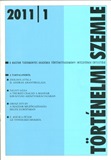Horthy Miklós és a katonai diktatúra
Miklós Horthy and the Military Dictatorship
Author(s): Pál PritzSubject(s): History
Published by: Magyar Tudományos Akadémia Bölcsészettudományi Kutatóközpont Történettudományi Intézet
Summary/Abstract: In contemporary Hungarian historiography both the person of Miklós Horthy and the characteristics of his regime are in the focus of heated debates. This situation has deep social roots. The fact that there still exists no full biography which is entirely in keeping with the requirements of scholarly history writing is not to be seen as a weakness of contemporary historiography. The valuable and groundbreaking work of the American historian, Thomas Sakmyster, published in English in 1994 and in Hungarian seven years later, which covers the quarter of a century of Horthy’s governorship, mentions two important documents, one of them English, the other American, which prove that the leader of the National Army regarded in 1919/20 military dictatorship as the only way out of the crisis. For Miklós Horthy, who came from the so-called Christian middle class, the world of magnates and plutocrats as represented by the era of István Tisza was far from ideal. Rather, he imagined a new Hungary as transformed by his own class through military dictatorship. The present study, which publishes the entire American document, and the relevant parts of the Engish one, and analyses both, tries to demonstrate that for the military politician that Horthy was at that time, the inter-party compromises, painfully achieved through the mediation of the Entente commissionary, Sir George Russel Clerk, the „concentration” government (that is, representing a kind of national unity), the calling of the elections and the preparations for them, represented no value at all.
Journal: Történelmi Szemle
- Issue Year: 2011
- Issue No: 01
- Page Range: 127-140
- Page Count: 14
- Language: Hungarian

